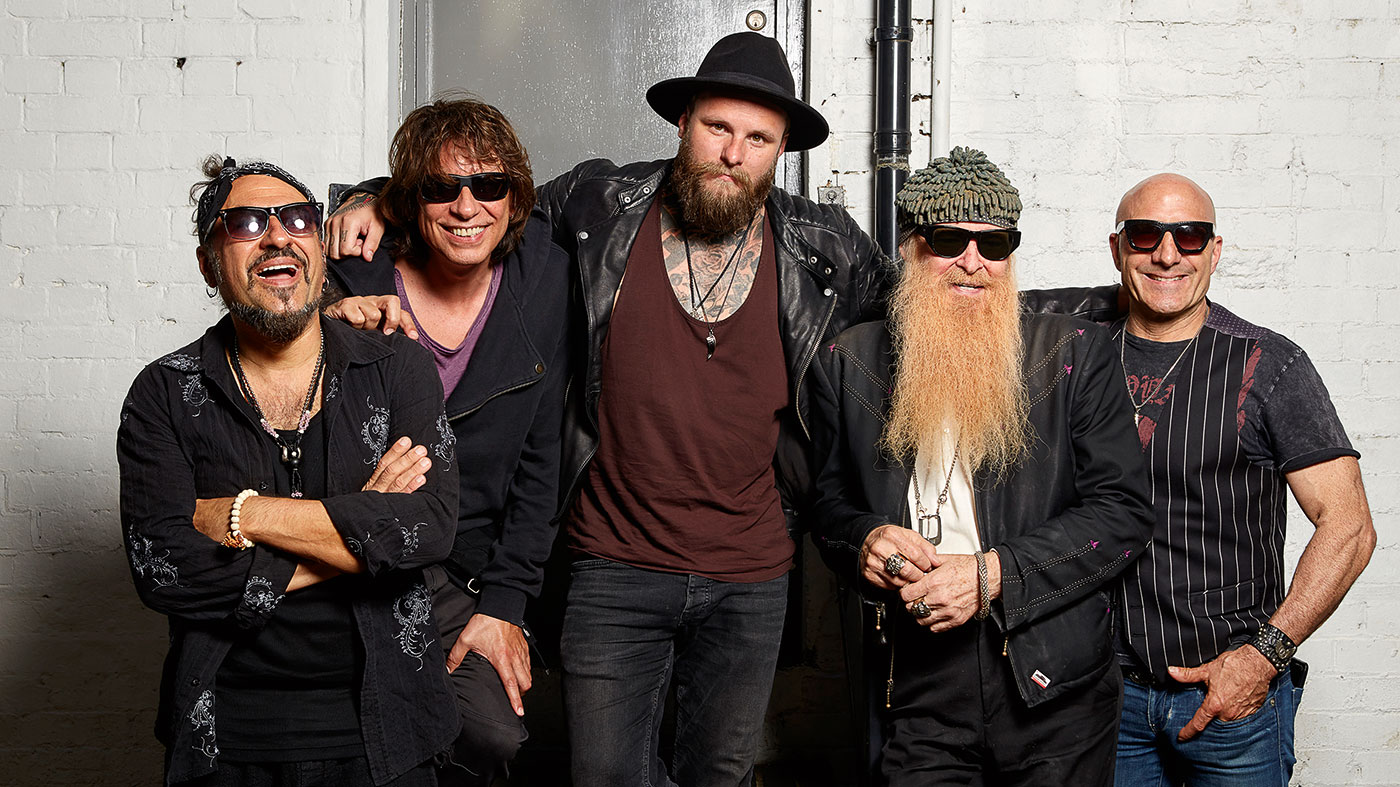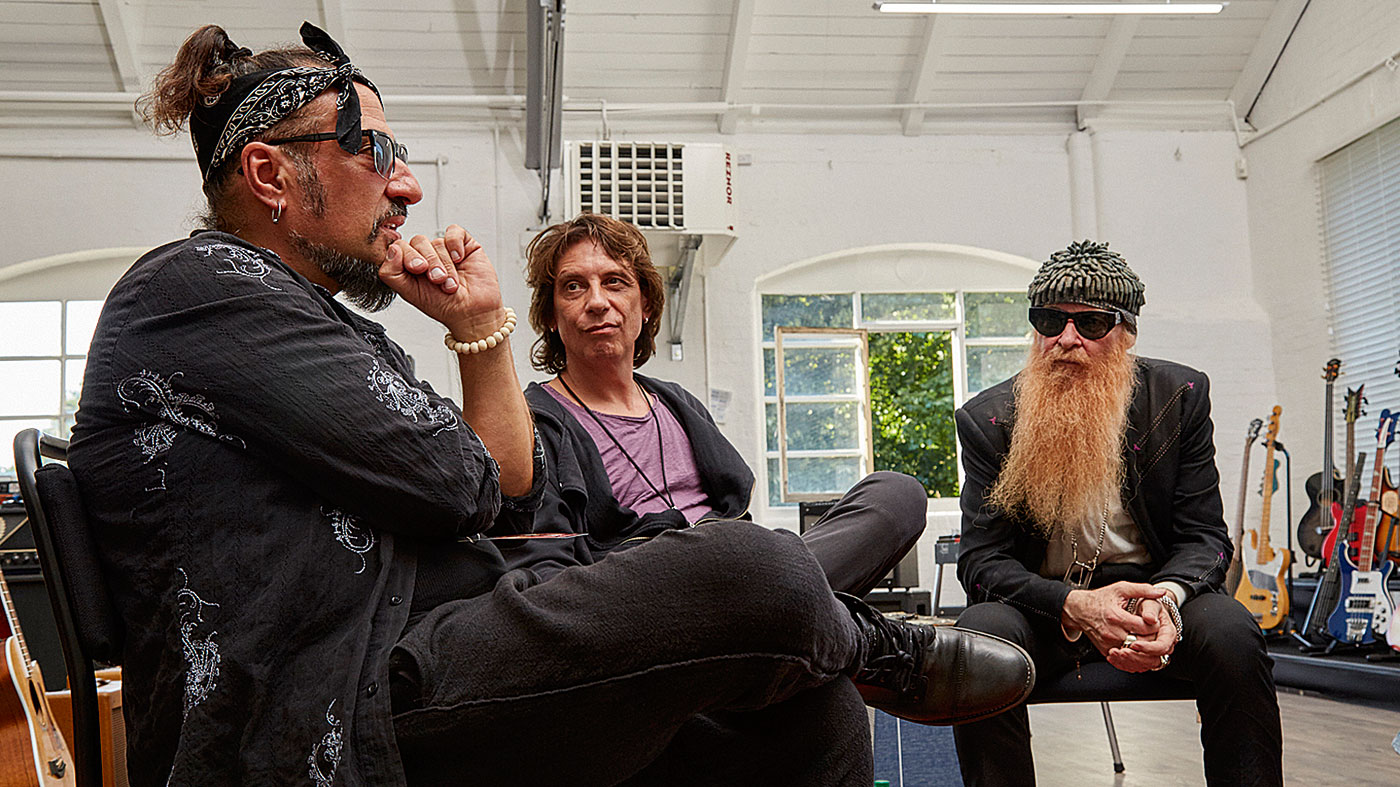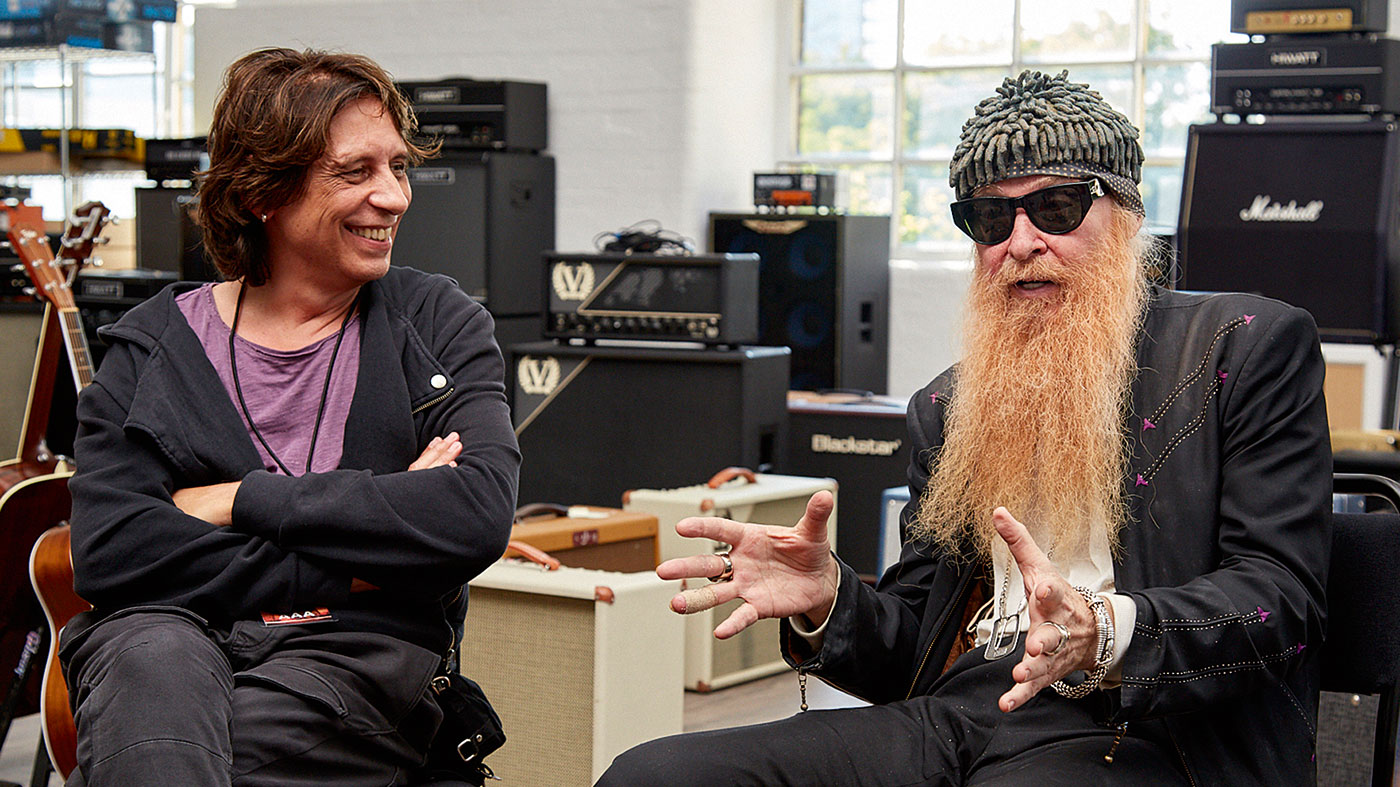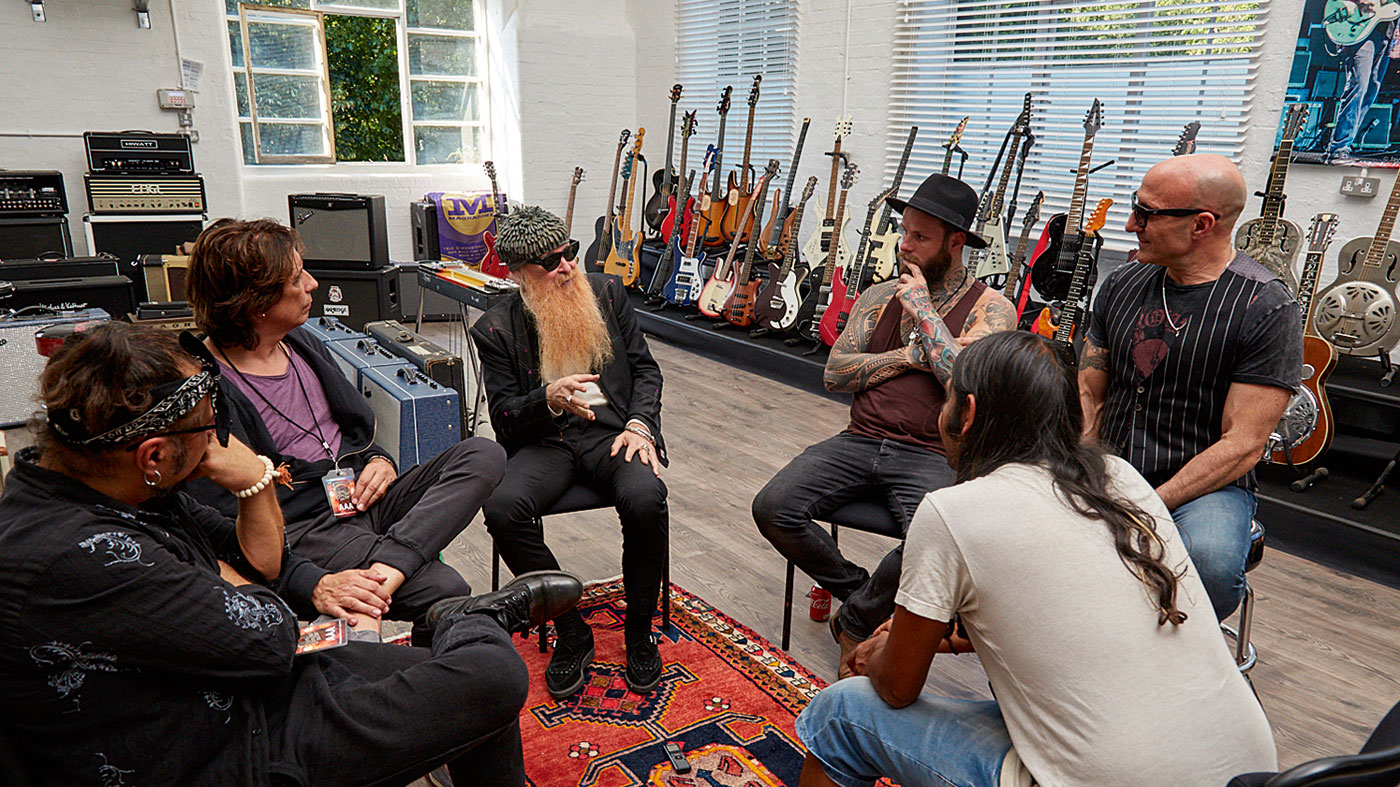Guitar round table - Supersonic Blues Machine: "The blues appears very simple on first glance, but there are some real complexities to this artform"
ZZ Top honcho Billy F Gibbons & friends look at the roots of guitar music

Want all the hottest music and gear news, reviews, deals, features and more, direct to your inbox? Sign up here.
You are now subscribed
Your newsletter sign-up was successful
Upstairs in one of London’s most prestigious rehearsal spaces, a discussion is taking place - dissecting one of the oldest forms of popular music and its place in the world today.
Leading the conversation is ZZ Top founder Billy F Gibbons, joined by his Supersonic Blues Machine comrades Fabrizio Grossi and Kenny Aronoff, alongside the band’s special guests Serge Simic and the UK’s Kris Barras.
Together, the five musicians explore how and why this near-ancient artform, even after all these years, still has the ability to make just about any human being feel things that other genres simply can’t come close to. Blues power, it seems, is something that will stay in our DNA…
What do you feel when you hear the words ‘blues power’?
It’s pretty cool when you think about it… this mysterious thing that is honestly powerful
Billy F Gibbons: “Well, I think those two words go together for sure. There’s something about this thing called blues that continues to resonate. There’s that old saying that every 10 years or so, things come back and get rediscovered, but I feel as if the blues has more to it. I think that the genre has an international and global appeal. It appears very simple on first glance, but when you start digging in deeper, you discover there are some real complexities to this artform.
“It’s pretty cool when you think about it… this mysterious thing that is honestly powerful. When you go back and listen to what Freddie King was doing purely instrumentally, it’s incredible. It was the same transition when Muddy Waters left his acoustic and figured out how to plug things in and get the whole electric thing going. It was a big, big change!”
Kris Barras: “I feel like blues music is very much a feeling. It comes from inside. I wouldn’t call myself a traditional blues player but I know that I’m definitely influenced by some of the old greats. I think blues power relates to the idea of playing from the heart and choosing certain notes with a special meaning.”
Want all the hottest music and gear news, reviews, deals, features and more, direct to your inbox? Sign up here.
Fabrizio Grossi: “When I think of the words ‘blues power’, I feel like no other kind of music has ever been able to generate so many genres and phenomena. Blues doesn’t have to be 100 per cent in its original form, you don’t have to sound like the godfathers to have taken influence from it. When I think how important those guys were for everything we hear today. I feel like 70 per cent of the music out there wouldn’t even exist without the blues.”
Serge Simic: “Everything from all of our influences combined will have come out of the blues. It’s still there today, all these years later - which is incredible. This genre is still so powerful.”

Universal language
It’s as if the blues is something that any human can understand - regardless of their musical or geographic background…
There’s a tension and release to the blue note. Because the flat five is not usually in the chords
Fabrizio: “I think everything about the blues stands to the wider music world just as much as the mob stands to organised crime - meaning everybody knows about it but they don’t really understand what goes on unless they’re in it. And once you’re in… you don’t get out! To the blues musician, it’s not about playing on the coolest night of the week. We will always have the club circuit - there’s a music mob that never gives up. In every guitar shop I’ve visited, whenever people walk in the first thing they play will be blues-based. The ideas are so married to the guitar, there’s a symbiosis there.”
Billy: “I love the idea of the blue note. This thing with all this feeling behind it. I don’t know if words will ever be adequate to express it. You know it when you hear it and you know it when you feel it.”
Kris: “There’s a tension and release to the blue note. Because the flat five is not usually in the chords, it extends into the world of jazz and other things.” Billy: “If you play in major thirds, it’s all happy. But hit that flat five or minor seventh and you will feel it… you will get the shivers.”
Speaking of flat fives, there was a time where tritones were banned by the church. Thankfully, times have changed…
Kenny Aronoff: “The religious people in most countries would have thrown you in jail for just playing a minor third let alone a flat five! It was against the law, even in places like England. The church wanted all the nicer harmonies and felt like the tritone was the devil’s interval...”
Billy: “It still is, ha ha!”
Kenny: “But check this out, even though the tritone is the most devilish interval of them all, [long-time director of the New York orchestra] Leonard Bernstein took that sound and made it one of the most beautiful songs ever in Maria from West Side Story. Somehow this genius made a beautiful love melody out of it. I think he was trying to say, ‘Hey, this note isn’t as bad as you’d think!’ Maybe he didn’t believe in the devil... maybe he did!”

Going blues
How hard is it to reinvent yourself as a blues artist?
Billy: “One of the greatest turning points for me was when Lollapalooza came to Orange County. There was a band there called Cypress Hill who were famous for smoking weed in front of the cops. Sure enough, there they were smoking weed in front of the authorities while 20,000 young white kids applauded. They had three singers fronting the band and one guy holding a DAT recorder, which was all the music. He stepped on the wire yanking it out and everything stopped - you could see the wave of tension spread, everyone wondering what will happen next.

Billy F Gibbons: these are the 10 guitarists who blew my mind
“One of them said, ‘Hey, we fucked up!’ and suddenly everybody relaxed. I think if you are able to accept whatever will happen, it will allow new expressions to come forward. You remove this layer of fear by saying you don’t care and just ploughing through. And sometimes that mistake could be the thing you were looking for all along...”
Kenny: “Because, at the end of the day, we will always make them!”
Fabrizio: “Personally, I don’t think you have to reinvent the blues, it’s cool just how it is. You get diff erent takes from different people because they are individuals. It’s an expression of feeling, so how one person thinks can be miles away from anyone else. As long as you are playing with your own heart and soul… that’s all you need. It’s not really about reinventing yourself as it is putting your own stamp on everything.
“The early ZZ Top recordings have a dirt and meanness to them while their approach in the 80s was completely different - but no matter what year it is or production style it gets, you just know it’s Billy playing. As soon as I hear him, it’s like I’m driving on a big freeway somewhere in the middle of Texas. He can carry his history and heritage through the music, which is something not many people can do. A lot of people can master pentatonics but to tell their story without being too obvious about it is quite rare.”

The blues also lends itself to blending both minor and major tonalities…
Billy: “The minor seems to be the bluer. I don’t really know much about tritones and whatnot, but I’ve always felt the minor side is where the blues lives. I don’t know many blues tunes that are major-y… it seems to belong with the sadder chords and scales.”
Kris: “When you mix minor and major, it’s like you get another blue note. You can play the minor third and bend up to the major third, which adds to the blues. A lot of guitarists get confused over this. I’ve walked into loads of bars and heard a dominant blues where the players stick to minor pentatonic and don’t resolve the minor third to major - which can sound horrible. It’s the same as landing on a fl at fi ve and holding it with no release… without the resolve it can sound bad. I actually think that’s one of the most important lessons for blues guitarists. Someone like Billy won’t need to think about it, he can just hear it in his head; most people can’t.”
I think everyone can agree if it sounds good, it really doesn’t matter whether it’s technically right or wrong
Billy: “There’s a subtle difference when you are in a perfect triplet shuffle, but it can lean towards 4/4 too - there’s a rhythmic tension from being in between straight and shuffle.”
Kenny: “It’s unbelievable how you can go in between both… that just sounds so cool to me. I like the idea of a rhythmic blues, sometimes a few members of the band are playing more straight and the others are doing a shuffle on top.”
Billy: “Listen to Jimmie Vaughan who did this buzz picking rhythm on Frame For The Blues… it’s like a drill noise that probably isn’t technically in time, but catches your attention. Equally, if you are in major and your keyboard player is in minor, you can have a jazz moment. Miles Davis to the rescue! There are no bad notes, it’s all about how you get out of it.”
Kris: “I mean the Hendrix chord is essentially that, isn’t it? With that 7sharp9 chord, the sharp9 is like the octave higher from the minor third!”
Fabrizio: “I think everyone can agree if it sounds good, it really doesn’t matter whether it’s technically right or wrong. We were in India last year, playing with an incredible guitar player who was brilliant at traditional blues but also mixed in Eastern scales, odd meters and quarter tones. I just couldn’t believe how well it fitted together, though obviously it only works if you know what you’re doing. Again, it’s another way of inventing rather than reinventing yourself.”
Billy: “You have to remember the guys that were recording blues in 1949 or 1950, they were just teenagers. And teenagers are mischievous! They were poking at it and clearly having a blast.”

The turnaround
What advice can you offer players who struggle to get their heads around turnarounds?
Billy: “Don’t learn the turnarounds. Don’t even go there. It goes from the five to the four and back to the one, and then starts over again. Just feel it and play through it. I’ve always found turnarounds pretty awkward.”
Kenny: “It’s almost more predictable to have a turnaround than it is not to. Then you have guys like Eric Gales who like to substitute before they’ve even left the one chord!”
Fabrizio: “But it’s all about how you sneak it in. Just like with anything, if you overuse it, then you will lose the eff ect. Even if you avoid one of the turnarounds, it can really change the song! Things like that make music great, you add and subtract to your own taste.”
My playing is about being a soldier for that song and the emotion you give to the crowd
Kris: “I like going back to the five chord when I’m soloing. You can spice it up a bit there, throw in some altered scale licks or something chromatic - it gives you something extra to do. I’m a big fan of the Super Locrian scale and for the chromatics, you can take something like a major triad and move it up a fret again and again. It’s the same with any shape. I had some lessons with Greg Howe, who is more fusiony, but he taught me about side-stepping - talking pentatonics out one fret and then back in key to create altered sounds.”
There’s a delicate art to dialling in the right amount of overdrive in blues. How do you decide what’s right?
Billy: “There is a sweet spot between clean and distortion. I don’t know how to describe it, it’s not quite either and it changes depending on what you are playing over…”
Serge: “My playing is all about the song. It’s not about me or the scales, it’s about being a soldier for that song and the emotion you give to the crowd. If it needs crunch, sure I will crunch it up. I think Robben Ford is one of the masters of that - he can get a clean sound that will ring out so beautifully. We had a big jam with him, Walter Trout and all these other players… everyone had their overdrive pedals and Robben came out with a clean Telecaster that sounded fantastic. He just cut right through.”
Fabrizio: “Few players can possess their guitar like that. Jeff Beck is like that too… one time I saw him and he used a pick for one song just to get a certain sound. For him, it was not a tool of the trade, but rather another way of breaking the rules. I like the idea of setting up the threshold for as far as you can go, then dialling it down and controlling everything from your guitar. One channel can have everything from clean to crunch to distortion.”
Billy: “Dynamics are integral to the blues. Jeff Beck saw Hubert Sumlin playing with his fingers and realised that was how he wanted to sound. He’s gotten so good at it; when I was 17 years old and on tour with Jimi Hendrix, every night we would get into a motel and he would stay at the end of the hall with his door always open. He’d be in there listening to the first Jeff Beck album with Rod Stewart and he asked me, ‘How does Jeff do all of this?’ I told him, ‘Believe me, Jeff is sat in a room right now, listening intently to your music asking himself how you do what you do!’ It was an eye-opener, seeing Jimi so blown away by other guitar players, as much as they were with him!”
Amit has been writing for titles like Total Guitar, MusicRadar and Guitar World for over a decade and counts Richie Kotzen, Guthrie Govan and Jeff Beck among his primary influences. He's interviewed everyone from Ozzy Osbourne and Lemmy to Slash and Jimmy Page, and once even traded solos with a member of Slayer on a track released internationally. As a session guitarist, he's played alongside members of Judas Priest and Uriah Heep in London ensemble Metalworks, as well as handling lead guitars for legends like Glen Matlock (Sex Pistols, The Faces) and Stu Hamm (Steve Vai, Joe Satriani, G3).


